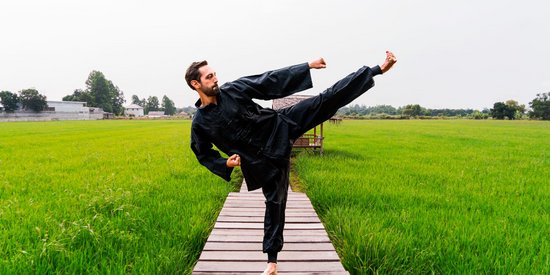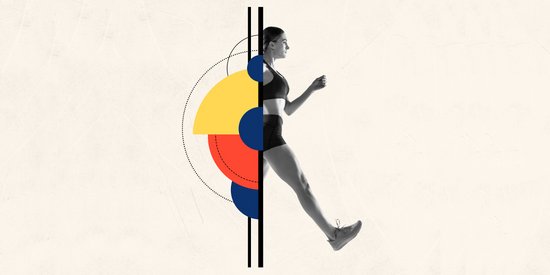Qi gong and Tai chi chuan, which one would best suit you between the two? Many people ask themselves this question.
In fact, these practices are similar in their principles, but different in their methods and objectives. Often mistakenly confused, Tai chi chuan and Qi gong are two very distinct disciplines which not only have their Chinese origins in common, but it is true that they are similar in several aspects, which creates confusion.
Could a wind from the Far East blow us a completely different order of things?
The quintessence of Chinese culture is a culture of life that links health to the development of the person, so the two disciplines focus on the work of body movement, breath and mind. "They are oriented towards the search for a state of harmony between the body and the spirit according to the theory of yin - the energy of the earth - and yang - the energy of the spirit - the basis of Chinese thought," confirms KE Wen, trainer and renowned Qi gong speaker. Tai ji Quan, Chinese doctor and philosopher, KE Wen is also the author of many best-selling books.
What is Tai chi?
Practiced for millennia in China, Tai chi is a system of exercises and movements developed long ago as a martial art and training in ancient China, more widely used now for health and well-being. In the West, we often consider Tai chi chuan as a form of gentle gymnastics, intended to evacuate tensions, but Tai chi chuan is also a method of relaxation, it can even give better health and longevity!
You will see Tai Chi written in many different ways: Tai Chi, T'ai Chi, T'ai Chi Ch'uan, Tai Ji, Taiji, Taijiquan, etc. Whatever the spelling, they all refer to the same art. Often called moving meditation, it can be practiced by almost anyone and with almost any kinds of ailments of the body and mind, where the two fundamental principles are Yin and Yang. The key concepts of Tai chi are rooting and releasing, accompanied by a series of slow and gentle movements that are inspired by the movements of nature. Most of the time, the movements are done standing up and in slow motion in order to perfect them, but they can also be faster, if the practitioner wishes to use this discipline as an art of self-defense. Tai Chi offers many benefits for the health of body, mind and soul, but without effort, this can be obtained through continuous and diligent practice. The benefits can be felt and seen after only a few group or one on one lessons. However, it can take months to properly learn a form of Tai chi and a lifetime to master it.
A spiritual dimension should also be noted in the practice of Tai chi, where meditation takes on its full meaning, promoting concentration through breathing, allowing you to achieve relaxation of body and mind through self-control. Whatever the case, above all, Tai chi chuan remains a martial art.
What is Qigong?
Widespread in many western countries only from the 1970s onwards, the roots of Qi gong go back thousands of years and are deeply linked to the Chinese way of life.
Qi gong allows you to regain awareness of your body, thanks to movements aimed at becoming more flexible, always accompanied by relaxation. It is an integral part of the branch of traditional Chinese medicine. Qi gong does not have the dimension of being a martial art.
Pronounced "Chi gong", Qi gong is an internal process that involves external movements compared to Tai chi. Qi means "life force", the energy that powers our body and mind.
Gong is the term which means work or gathering. Together, Qi gong means a form of movement and mind-using intention and mindfulness, to guide the Qi to make it work. Qigong often includes sets of exercises or self-contained practices. Qi gong also often consists of a single movement repeated ad infinitum. Sometimes it doesn't involve any movement, but just focuses on the breath.
There are a multitude of methods and forms of Qi gong, ranging from seated or standing meditation to certain vigorous and movement-rich forms. People all over the world use Qi gong to relax, heal and connect their minds and bodies to the flow of energy. Traditional Qi gong theory, says that we can focus on a feeling, emotion, body part, concept, or goal and our Qi, or energy, goes where our mind sends it.
Practicing the same movement over and over stimulates muscles, bones, heart, breathing and other body functions.
What is the difference between Tai chi and Qi gong?
In the west, Tai chi is better known than Qi gong. but in its homeland, Qigong is a part of everyday life. Qigong is part of China's national health plan and is practiced in schools, universities and hospitals.
So, in reality, the biggest difference between Qi gong and Tai chi is the actual meaning of the work regarding the "chi."
Here is the simplest recap:
- Qigong is a technique for health
- Tai Chi is a martial art
Although more precise than Qi gong, Tai chi chuan brings similar benefits, it is however recommended to learn Qi gong before learning Tai chi chuan.
Choosing the type of workout is partly a matter of personal preference and partly a matter of desired outcome.









